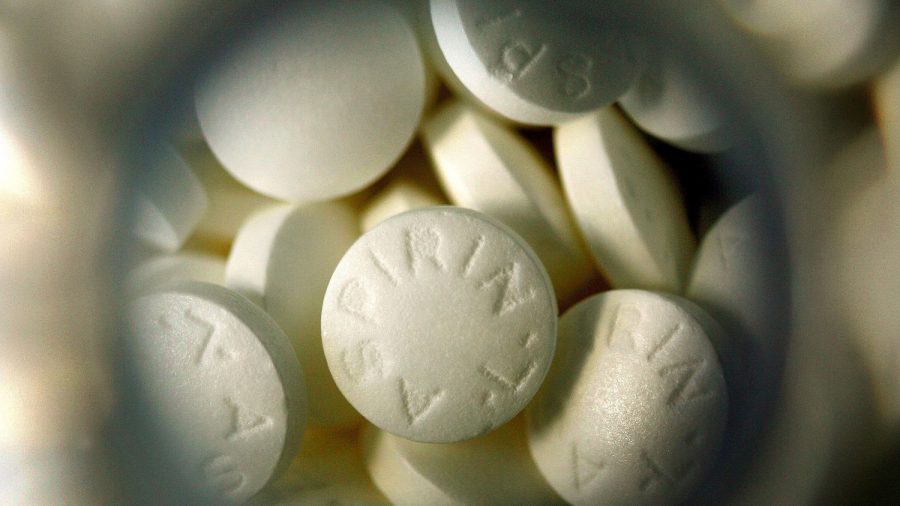Some aspirin has been linked to an increased risk of bleeding in the skull, according to a new study.
Researchers focused on studying whether preventative, low-dose aspirin increased the frequency of “intracranial hemorrhage,” or bleeding in the skull, in the general population.
The review of 13 randomized clinical trials and other information found that people who take the low-dose aspirin have a higher risk of bleeding in the skull if they don’t have symptomatic cardiovascular disease.
The trials enrolled over 134,000 patients.

“Pooling the results from the random-effects model showed that low-dose aspirin, compared with control, was associated with an increased risk of any intracranial bleeding, with potentially the greatest relative risk increase for subdural or extradural hemorrhage, and less for intracerebral hemorrhage and subarachnoid hemorrhage,” researchers wrote in the study results, which were published in JAMA Neurology.
The review found that people who took a placebo in the trials had a 0.46 percent risk of having a head bleed. People who took the low-dose aspirin had a 0.63 percent risk. The difference was equal to an additional two out of every 1,000 people suffering bleeding in the skull.
The review also found that people of Asian descent and people with a low body mass index have an increased risk of bleeding in the skull.
“Among people without symptomatic cardiovascular disease, use of low-dose aspirin was associated with an overall increased risk of intracranial hemorrhage, and heightened risk of intracerebral hemorrhage for those of Asian race/ethnicity or people with a low body mass index,” they wrote.
The study was conducted by Wen-Yi Huang of the Department of Neurology at the Chang Gung University College of Medicine and Chang Gung Memorial Hospital in Taiwan; Jeffrey Saver of the Los Angeles Stroke Center, University of California; and Wi Ling-Wu of the Institute of Population Health Sciences, National Health Research Institutes in Taiwan, with three others assisting.

Doses
Low-dose aspirin, such as Ecotrin, is typically recommended by doctors to patients who have had a heart attack or stroke, according to the Mayo Clinic.
“Aspirin interferes with your blood’s clotting action. When you bleed, your blood’s clotting cells, called platelets, build up at the site of your wound. The platelets help form a plug that seals the opening in your blood vessel to stop bleeding. But this clotting can also happen within the vessels that supply your heart with blood,” it stated.
“If your blood vessels are already narrowed from atherosclerosis—the buildup of fatty deposits in your arteries—a fatty deposit in your vessel lining can burst. Then, a blood clot can quickly form and block the artery. This prevents blood flow to the heart and causes a heart attack. Aspirin therapy reduces the clumping action of platelets—possibly preventing a heart attack,” it continued.
Low-dose aspirin typically contains 75 to 150 milligrams but most commonly contains 81 milligrams. Regular strength aspirin typically contains 325 milligrams.
Until March, a daily dose of aspirin was thought to help prevent a heart attack but new guidelines issued that month advised people who haven’t suffered a stroke or heart attack, or undergone bypass surgery or gotten a stent inserted, to avoid taking low-dose aspirin. The new guidelines came after three studies recast the benefits of low-dose aspirin for some people, highlighting the potential for bleeding and other risks.
“For primary prevention, the risk of bleeding and the benefits of reducing heart attack are pretty matched, even to even. So there isn’t a lot of gain for taking aspirin,” Dr. Erin Michos, one of the writers of new prevention guidelines developed by the American Heart Association and American College of Cardiology, said in an interview published by the association.
Michos said that individuals should consult with their doctors and may still be advised to take the aspirin in some cases, such as having a family history of heart disease, or if tests detect plaque buildup in their arteries.
Most people, though, should focus on developing better habits.
“Eat a heart-healthy diet, get regular physical activity, control blood pressure and control cholesterol,” she said. “If they need the statin, take it. Those are much more important when compared to recommending aspirin.”


